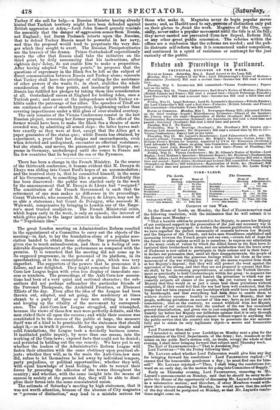The great London meeting on Administrative Reform resulted in the
appointment of a Committee to carry out the objects of the meeting—in fact, to lay the foundation-stone of a popular asso- ciation banded to obtain those objects. The proceedings have given rise to much animadversion, and there is a feeling of con- siderable disappointment at the performance as compared with the promise. It is remarked that the meeting did not come up to its supposed programme, in the personnel of its platform, in its speechmaking, or in the enunciation of a plan, which was very imperfect. The supporters of the powers that be pronounce it a failure, and are delighted. They might remember that the Anti- Corn-law League began with even less display of immediate suc- cess or numbers. The proceedings of the Anti-Corn-law associa- tions had been of a -very quiet and sectional character ; the sub- toribers did not perhaps outnumber the particular friends of the Perronet Thompsons, the Archibald Prentices, or Ebenezer FIliots of the day. Even after the idea of the League had been thrown out, adopted, and set going, the machinery at times shrank 'to a party of three or four men sitting in a room and keeping up the vitality of the movement by correspond ewe. The Anti-Corn-law League struggled, and triumphed, because the views of those few men were perfectly definite, and the men staked their all upon the success ; and while their success was constituted to be the success of the public at large, the measure itself was of a kind to be practicable for the statesmen that should adopt it,—as in truth it proved. Resting upon these simple and solid foundations, the League took a decidedly business course. It instituted public inquiry, by more than one means, into the working of the Corn-laws ; exposed facts that could not be denied; and persisted in holding out the one remedy. We have yet to see whether the leaders of the Administrative Reform League will fasten their attention with the same obstinacy upon practical_ ob- jects; whether they will, as in the main the Anti-Corn-law men did, refuse to let themselves be led away by individual tempers, party prejudices, or political opportunities ; whether they will, with equal knowledge of local feeling, be able to recruit their forces by,proouring the adhesion of the towns throughout the country; and whether, with the same insight into the means of success in society at the present day, they will be able to disci- pline their forces into the same concentrated union.
The estimate of Saturday's meeting by high statesmen, that it was not worth attention, because of the absence of City magnates or " persons of distinction," may lead to a mistake serious for
those who make it. Magnates never do begin popular move- ments; and, as Hazlitt used to say, persons of distinction only put on their gloves to finish the work. Magnates of the City, espe- cially, never enter a popular movement mail the tide is at its full; they never carried nor prevented Corn-law Repeal, Reform Bill, or any other great public concession. The reforms within the offices are a confession that the reforms are needed ; and the pub- lic distrusts self-reform when it is commenced under compulsion, and continued in a spirit of resistance or contempt for the just curiosity of the public.


























 Previous page
Previous page